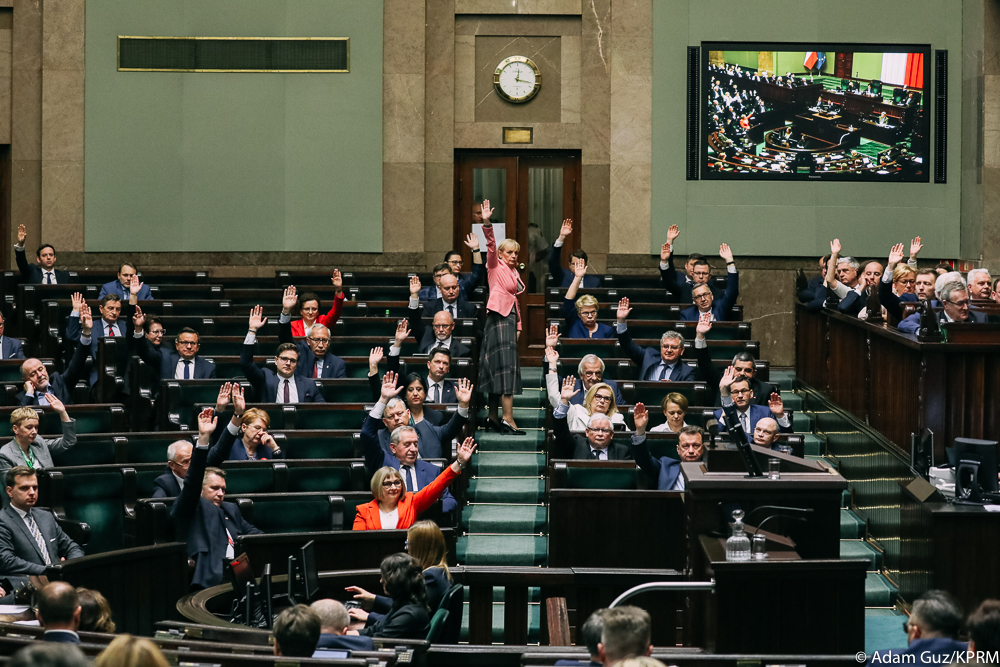The lower house of Poland’s parliament, the Sejm, has approved legislation to abolish the disciplinary chamber for judges, one of the European Commission’s central demands in order to unlock billions of euros of funds frozen over rule-of-law concerns.
While the move appears to pave the way for an agreement with the commission – whose president, Ursula von der Leyen, is due to visit Warsaw next week – the opposition and some experts have argued that the proposed legislation makes only cosmetic changes to the disciplinary system.
In a vote yesterday evening, a narrow majority of 231 MPs in the 460-seat Sejm approved a bill – based on one proposed by President Andrzej Duda in February – that will liquidate the disciplinary chamber and replace it with a “chamber of professional responsibility”.
Most of those votes came from the United Right (Zjednoczona Prawica) ruling coalition. That included MPs from hardline junior coalition partner United Poland (Solidarna Polska), who had previously expressed opposition to compromise with the EU but changed position after some amendments were made to the bill.
Opposition parties voted against the legislation, however, saying that it simply creates another disciplinary chamber with a new name rather than resolving the rule-of-law concerns raised by them and the EU. Some experts and judges have made the same argument.
“[This] is not a retreat, it is not a desire to restore certain standards,” Michał Laskowski, a Supreme Court judge told RMF FM yesterday. “This is an apparent step back, but in fact nothing changes. The most important issues related to the rule of law are not eliminated.”
Jakub Jaraczewski, a legal expert at Democracy Reporting International, notes that “the bill fixes some issues identified by the European Commission, but doesn’t address most of them”.
🇵🇱 Three things about yesterday's vote on the Supreme Court/Disciplinary Chamber bill for you all to consider:
1. This was not the final vote. The bill passed through the lower house (Sejm), and now it goes to the upper house (Senat). pic.twitter.com/PLOTcaYO3J
— Jakub Jaraczewski (@J_Jaraczewski) May 27, 2022
The legislation now passes to the upper-house Senate, where the opposition has a majority. However, while the Senate can delay the bill for up to 30 days, and can also suggest amendments or reject it outright, any such moves can then be overturned by the more powerful Sejm.
If and when the Sejm approves a final version of the legislation, it then passes to Duda – who is usually a government ally – for his final approval. Yesterday the president’s chief of staff, Paweł Szrot, indicated they were happy with the bill, saying that it includes “all the key elements” proposed by Duda.
W przyjętej przez Sejm RP ustawie o zmianie ustawy o Sądzie Najwyższym pozostały wszystkie kluczowe elementy, które zawierał projekt Prezydenta RP @AndrzejDuda. Kompromis w kraju, kompromis za granicą.
— Paweł Szrot (@PSzrot) May 26, 2022
Meanwhile, on Wednesday European Commission spokeswoman Dana Spinant confirmed reports that von der Leyen was planning to visit Warsaw on 2 June. However, she noted that the visit was contingent on negotiations over unlocking Poland’s Covid recovery funds being completed.
The commission has been withholding those funds from Poland due to concerns over the rule of law, and in particular the disciplinary system for judges. It has demanded not only the elimination of the disciplinary chamber, but also broader reforms to the system and the return of judges previously suspended by it.
Earlier this month, the Polish government announced that it had agreed with Brussels the “milestones” needed to unlock the funds, though neither side has yet revealed the specifics of the deal. Speaking after yesterday’s vote, government spokesman Piotr Müller said that the bill passed by the Sejm “fulfils the milestones”.
The abolition of the disciplinary chamber could also bring an end to the €1 million daily fines Poland has been receiving since last November for failing to comply with a European Court of Justice ruling to suspend the chamber.
Main image credit: Adam Guz/KPRM (under CC BY-NC-ND 2.0)

Daniel Tilles is editor-in-chief of Notes from Poland. He has written on Polish affairs for a wide range of publications, including Foreign Policy, POLITICO Europe, EUobserver and Dziennik Gazeta Prawna.




















